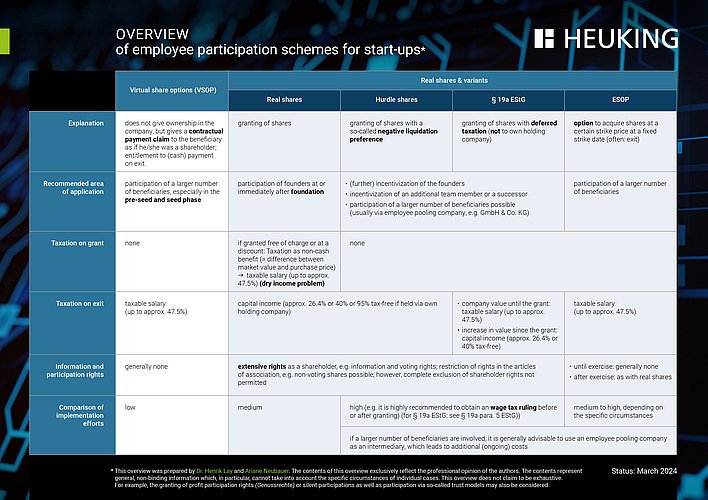Future Financing Act: The German government introduced a framework for more advantageous tax treatment of employee shareholdings
Future Financing Act: The German government passed the Future Financing Act that enhances the tax framework pertaining to employee shareholdings. The law will now make its way to a reading in the Bundestag, the Lower House of the German Parliament.
On August 16, 2023, the German government adopted draft legislation on the act on the financing of future investments (Future Financing Act). The amendments to the Income Tax Act are set to enter into force on January 1, 2024. Consent of the Bundestag and the Bundesrat [Federal Council] is still required.
It is noteworthy that the government bill largely encompasses the provisions that were already included in the draft bill on which we reported in our April 12, 2023 article. Those include specifically:
- Adjustment of the so-called realization events
The primary challenge currently impeding the application of Section 19a Income Tax Act, as amended in July 2021, pertains to the concept of a so-called realization event. This provision mandates the initiation of deferred taxation irrespective of resales in cases where a period exceeding twelve years has elapsed since the acquisition of shares or the termination of a service or employment relationship. These realization events have thus far rendered the provision outlined in Section 19a Income Tax Act irrelevant in practical application. The Future Financing Act is now designed with the aim of addressing this particular scenario. As stipulated in the government bill, there is a proposal to extend the relevant period to a duration of 20 years, which had already been outlined in the draft bill. In addition, even in the event that the service or employment relationship ends, taxation of the granting of shares shall only occur upon an actual sale, provided that the employer declares to the tax authorities that it is liable for the (wage) tax to be withheld and remitted.
- Leaver cases
Like the draft bill, the government bill stipulates that, in the event of a repurchase of shares, taxation will be determined based at most on the purchase price paid in the course of the repurchase. Especially in leaver cases, the purchase price is typically lower than the market value of the participation. This serves to reduce the potential tax burden associated with unrealized gains. The inclusion of provisions in the government bill that permit a repurchase by both the employer and a shareholder of the employer is a positive development, particularly when compared to the draft bill which did not encompass such provisions. This considers the commonly encountered scenario in which, in the case of a leaving shareholder, the shares are acquired by the co-shareholders rather than by the company itself.
- Expansion of the forms of participation
One frequently encountered challenge regarding the application of Section 19a Income Tax Act in its present form is that the shareholding is not necessarily granted in the company with whom the employment relationship is established, but rather in the parent company of a group, for instance. Frequently, the participation is also to be granted by a shareholder of the employer. As previously outlined in the draft bill, the government bill stipulates that both scenarios must be considered. Unlike previous practices, the forthcoming regulations will encompass not only the direct grant of shares by and in the employer, but also extend to cases where shareholdings are granted in affiliated companies (as defined by Section 18 Stock Corporation Act) or in a shareholder of the employer.
- Extension to scale-ups
The government bill follows the previously proposed draft bill by further extending the applicability of deferred taxation to so-called scale-ups. In the future, the revised regulation will be applicable to enterprises that satisfy double the (as opposed to the prior single) “SME criteria”. As per the government bill, the number of employees would henceforth even be calculated as four times the threshold values. The fulfillment of the benchmarks during the transfer or takeover, or within the last six calendar years instead of solely the previous calendar year, along with the company’s establishment within a maximum of 20 years rather than the prior limit of twelve years, would be deemed satisfactory. In this regard, the government bill explicitly states that the sole consideration relates to the employer’s company itself, without factoring in any other affiliated entities within the group.
- Increase of the tax-free amount
In accordance with the draft bill, the tax-free amount outlined in Section 3 no. 39 Income Tax Act, which pertains to the tax-free treatment of certain asset transfers provided to employees at no cost or at a reduced price, is set to be raised from its current amount of EUR 1,440 to EUR 5,000 per calendar year. Nevertheless, it is important to note that the tax-free amount exclusively pertains to situations where the employee participation program is accessible to all employees who have maintained a tenure of at least one year with the company. Based on the government bill, it is possible for employee share ownership plans to be funded through conversion of compensation, with a maximum limit of EUR 2,000. The provisions outlined in the draft bill had still recommended the tax allowance to be excluded in all instances involving a conversion of compensation.
Nevertheless, the government bill exhibits certain deficiencies when compared to the draft bill. Regrettably, the government bill did not incorporate the inclusion of a lump sum taxation option of 25% for the non-cash benefit received from share transfers or acquisitions. Consequently, the non-cash benefit provided to employees due to the transfer or acquisition of shares remains ultimately liable to be taxed at the prevailing personal income tax rate, typically set at 42%. Considering the significant criticisms that have already been raised previously, including those from members of the ruling coalition, however, it was predictable that the initial intention to prioritize the non-cash benefit over other elements of the compensation would not endure through the legislative process. Given the global competition for skilled individuals, it is worth noting that this measure may have served as a potent tool in enhancing Germany’s position as a favorable destination for businesses, as also affirmed by the German Startup Association.
Given the global competition for talent, it would have been advantageous if the initially proposed uniform taxation system had been incorporated into the government bill, encompassing not only the grant of real shares but also the taxation of virtual shares. The conferral of a “genuine” shareholding gives rise to several relevant legal matters. The expenses related to a “genuine” shareholding should not be overlooked either. It is unlikely, however, that this topic will be revisited in subsequent stages of the legislative process.
The matter pertaining to the valuation of the shares granted also remains unacknowledged although it is necessary to ascertain the amount of the non-cash benefit provided during the process of transferring or acquiring shares, which subsequently results in the deferral of taxation. The valuation of a startup or scale-up is inherently challenging, and traditional valuation approaches frequently prove inadequate. The existing regulation, and, according to the draft bill and government bill, also future regulation stipulates that the permanent establishment revenue office is responsible for verifying non-cash benefits provided by employers through wage information request after the transfer or acquisition of company shares. This regulation may, however, be considered inadequate in various scenarios, particularly because the information request does not have a legally binding effect on the employee’s residence revenue office during the tax assessment process. An optimal resolution in this context would involve the provision of legally enforceable assurance to both employers and employees in advance.
In general, however, the favorable parts of the presented government bill are surpassing the unfavorable ones. We will keep you updated on further developments.

![[Translate to English:]](/fileadmin/_processed_/3/3/csm_Lay__Dr._Henrik_print_ca7eabe0f2.jpg)








